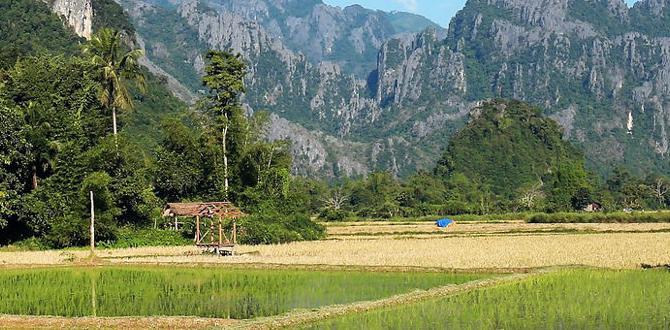Auckland on a budget is totally achievable! This guide offers essential tips for saving money on accommodation, food, transport, and attractions, ensuring a fun and affordable adventure in New Zealand’s largest city.
Exploring a new city like Auckland doesn’t have to break the bank. Sometimes, the thought of travel expenses can feel a little overwhelming, especially when you’re trying to stick to a budget. But with a little planning and some clever strategies, you can experience the best of Auckland without spending a fortune. Think of it as a treasure hunt for deals and local gems! We’re here to show you exactly how to make your Auckland trip both memorable and wallet-friendly.
Your Auckland Budget Travel Adventure Starts Here
Welcome to your essential guide to experiencing Auckland without the hefty price tag! As New Zealand’s vibrant heart, Auckland offers everything from stunning harbors to lush green spaces, delicious food, and exciting activities. The good news? You don’t need a king’s ransom to enjoy it. This guide is packed with practical, budget-friendly tips to help you navigate the city like a pro, ensuring comfort and fun every step of the way. Let’s dive into how we can make your Auckland journey an incredible, affordable experience!
Saving on Auckland Accommodation: Your Home Away From Home
Finding a comfortable and affordable place to stay is key to any budget trip. Auckland offers a range of options, from cozy hostels to budget-friendly hotels and unique apartment rentals. Choosing wisely can significantly impact your overall spending.
Hostels: The Social and Savvy Choice
Hostels are fantastic for solo travelers or anyone looking to meet new people. They offer dorm-style rooms, which are the cheapest, but many also have private rooms if you need a bit more privacy. Perks often include communal kitchens, common areas, and organized social events.
- Pros: Very affordable, great for meeting fellow travelers, often have kitchens to save on food costs, social atmosphere.
- Cons: Can be noisy, less privacy in dorm rooms, shared bathrooms.
When choosing a hostel, look at its location. Staying close to public transport or city attractions can save you money and time on getting around.
Budget Hotels and Motels: Comfort and Simplicity
For those who prefer a bit more privacy than a hostel but still want to keep costs down, budget hotels and motels are a great option. These often provide basic amenities like a private bathroom, TV, and sometimes a small fridge. Many are located a short bus or train ride from the city center, offering a good balance of cost and convenience.
- Tips for Booking:
- Book in advance, especially during peak season.
- Compare prices on different booking websites.
- Read recent reviews for insights into cleanliness and service.
- Consider locations slightly outside the immediate city center for better rates.
Vacation Rentals & Airbnb: For Longer Stays or Families
If you’re traveling with family or planning a longer stay, consider looking at vacation rentals or Airbnb. Renting an apartment or even a private room can be cost-effective, especially when you factor in the ability to cook your own meals. Many listings come with full kitchens, saving you money on dining out.
- Benefits:
- More space and privacy.
- Access to a full kitchen.
- Can be more economical for groups or longer stays.
- Experience a more local feel.
Always check the cleaning fees and overall cost to ensure it fits your budget. Look for hosts with good reviews and clear cancellation policies.
Eating Your Way Through Auckland on a Budget
Food is a significant part of any travel experience, and Auckland’s culinary scene is diverse. You can enjoy delicious meals without emptying your wallet by exploring local markets, cafes, and ethnic eateries.
Gourmet on a Shoestring: Supermarket Savvy
Supermarkets are your best friend for budget eating. Stock up on breakfast items, snacks, and ingredients for simple lunches or dinners. Major supermarkets like Countdown, New World, and Pak’nSave are found throughout the city and offer great value.
- Tips for Supermarket Success:
- Buy bread, cheese, fruits, and pre-made salads for easy lunches.
- Look for daily specials and discount items.
- Many supermarkets have a deli or bakery section for affordable hot food or pastries.
- Consider buying a small esky (cooler box) to keep perishables fresh for picnics.
Food Trucks and Markets: A Taste of Adventure
Auckland boasts a vibrant food truck scene and bustling weekend markets offering delicious and affordable eats. This is where you can sample diverse cuisines from around the world in a casual setting.
- Popular Spots:
- La Cigale French Market (Parnell): While known for its artisanal products, it also features excellent food stalls on Saturdays.
- City Works Depot: A popular spot for food trucks offering a variety of cuisines.
- Street Food Gatherings: Keep an eye out for pop-up food events advertised on local event listings.
Markets are not just about food; they’re also great places to soak in the local atmosphere and find unique, affordable souvenirs.
Cheap Eats Districts: Local Flavors, Small Prices
Certain areas in Auckland are known for their abundance of affordable eateries. Explore neighborhoods that cater to a diverse population to find excellent value for money.
- Dominion Road: Famous for its wide array of Asian restaurants, offering everything from authentic Chinese dumplings to delicious Vietnamese pho at very reasonable prices.
- Broughton Street (Orakei): Features several local cafes and takeaways that are popular with residents.
- City Centre’s Hidden Gems: Many small cafes and food courts tucked away in office buildings and alleyways offer budget-friendly lunch options.
Getting Around Auckland: Smart Transport for Savvy Travelers
Navigating Auckland doesn’t require a personal chauffeur or expensive taxis. The city has a good public transport network, and many attractions are accessible on foot or by bike.
Auckland Transport (AT) HOP Card: Your Key to Savings
The AT HOP card is essential for budget travel on Auckland’s public transport network, which includes buses, trains, and ferries. You load money onto the card, and each journey is cheaper than paying with cash.
- How it Works:
- Purchase a HOP card from participating retailers (like dairies or supermarkets), AT HOP retailers, or online.
- Load credit onto your card – you can do this online, through the AT HOP app, at ticket machines, or visitor centers.
- Tag on when you start your journey and tag off when you finish.
- Journeys are cheaper with a HOP card compared to cash fares.
The AT HOP card makes hopping on and off buses and trains seamless and significantly reduces travel costs. You can find more information on their website: at.govt.nz.
Walking and Cycling: Explore at Your Own Pace
Auckland’s city center and waterfront areas are very walkable. Many key sights like the Viaduct Harbour, Wynyard Quarter, and Albert Park are best explored on foot. This is free and allows you to discover hidden details you might miss otherwise.
For exploring further afield, consider renting a bike. Auckland has several bike rental companies, and cycling is a fantastic way to see areas like the waterfront paths or even venture out towards the West Coast beaches if you’re feeling adventurous (and prepared!).
Ferries: Scenic and Practical
Auckland’s ferries are not just transport; they are attractions in themselves, offering stunning views of the Hauraki Gulf and surrounding islands. Services run to popular destinations like Waiheke Island, Rangitoto Island, and Devonport.
- Budget Ferry Tips:
- Check the AT HOP card fares, as they are often cheaper than cash fares for many routes.
- Consider day trips to nearby islands like Rangitoto for a hike, or Waiheke for its vineyards (you don’t have to do wine tastings to enjoy the island).
- Travel during off-peak hours if possible for potentially lower fares.
Free and Affordable Attractions in Auckland
Auckland is brimming with fantastic activities that cost little to nothing. You can experience the city’s natural beauty and cultural highlights without spending a cent.
Parks and Natural Wonders: Auckland’s Green Heart
Auckland is known as the ‘City of Sails,’ but it’s also a city of incredible green spaces. These parks offer relaxation, recreation, and stunning views.
- Auckland Domain: Home to mature trees, walking paths, sports fields, and the impressive Auckland War Memorial Museum (entry fee applies, but the grounds are free to explore).
- Cornwall Park & One Tree Hill: A vast, picturesque park with ancient trees, walking trails, and panoramic city views from Maungakiekie (One Tree Hill). You can often see sheep grazing here!
- Botanic Gardens (Manurewa): Vast and beautiful gardens showcasing diverse plant collections, walking paths, and themed areas. Perfect for a peaceful stroll.
- Mount Eden (Maungawhau): An iconic volcanic cone offering 360-degree views of Auckland. It’s a sacred Māori site and a beautiful spot for sunset.
Vibrant Waterfronts: Strolling and Soaking in the Atmosphere
Auckland’s waterfronts are a hub of activity and offer fantastic free experiences.
- Viaduct Harbour: Wander among luxury yachts, enjoy street performers, and catch the sea breeze.
- Wynyard Quarter: A regenerated industrial area now featuring promenades, playgrounds, and vibrant public spaces, often hosting events.
- Mission Bay: Take a leisurely walk along the promenade, relax on the beach, and enjoy views of Rangitoto Island.
Free Cultural Experiences
Immerse yourself in Auckland’s culture without the price tag.
- Street Art: Explore the city’s laneways and discover vibrant murals and street art, particularly in the CBD and Freemans Bay.
- Gallery Hopping: While the Auckland Art Gallery Toi o Tāmaki has an entry fee for its main collections, it often has free exhibitions in its public spaces. Check their schedule for free entry days or specific free galleries.
- Wharves and Markets: Simply exploring the bustling areas like the Ferry Building and the Victoria Park Market (though browsing is free!) can be an experience in itself.
Budget-Friendly Day Trips from Auckland
While Auckland itself offers plenty, the surrounding regions are also accessible and offer incredible value for day trips.
Devonport: Quaint Village Charm
A short and affordable ferry ride from the CBD, Devonport is a charming seaside village with Victorian architecture, boutique shops, cafes, and beautiful beaches. Climb North Head or Mount Victoria for panoramic views of the harbor and city skyline.
Waiheke Island: Wine Views Without the Wine Price Tag
Waiheke Island is famous for its vineyards and stunning beaches. While wine tasting tours can be expensive, you can take the ferry over, enjoy the beautiful scenery, explore Oneroa village, and have a picnic on one of its many beaches. Some vineyards have affordable cafes or offer tastings at reasonable prices. It’s a great day out even if you’re not a big wine drinker.
West Coast Beaches: Wild and Wonderful
If you have access to a car or are part of a tour group, the wild West Coast beaches like Piha, Karekare, and Muriwai are a must-see. These dramatic black-sand beaches offer rugged beauty, hiking trails, and the chance to see gannet colonies (at Muriwai). Access is free, but transport will be your main expense.
For public transport options to these areas, it’s best to check regional bus routes, though they can be time-consuming and require transfers.
Essential Packing for a Budget Trip to Auckland
Packing smart can save you money by reducing the need to buy items on the go. Think versatile, comfortable, and practical.
- Comfortable Walking Shoes: You’ll be doing a lot of exploring on foot. Prioritize comfort!
- Layers of Clothing: Auckland’s weather can be unpredictable. Pack light layers like t-shirts, jumpers, and a waterproof jacket.
- Reusable Water Bottle: Stay hydrated and save money by refilling your bottle at water fountains found in parks and public areas.
- Snacks: Pack some non-perishable snacks for long journeys or hikes.
- Sun Protection: Hat, sunglasses, and sunscreen are essential, even on cloudy days.
- Small Backpack: For carrying your daily essentials, water bottle, snacks, and any souvenirs.
- Travel-sized Toiletries: Consider bringing along travel-sized personal items, especially if traveling with specific needs like adult diapers for extended comfort on long travel days or longer trips, reducing worry and enhancing mobility.
Example Budget Breakdown: A Day in Auckland
Here’s a sample of how your daily expenses might look on a budget. Prices are approximate and can vary.
| Category | Estimated Cost (NZD) | Notes |
|---|---|---|
| Accommodation (Hostel Bed/Budget Motel) | $40 – $80 | Based on per person, per night |
| Breakfast (Supermarket/Cafe Pastry) | $5 – $10 | Grab-and-go options |
| Lunch (Food Truck/Supermarket Salad) | $10 – $15 | Affordable and filling |
| Dinner (Cheap Eats Restaurant/Home Cooked) | $15 – $25 | Exploring local cuisine affordably |
| Transport (HOP Card, 3-4 short trips) | $10 – $15 | Using public transport efficiently |
| Attractions (Mostly Free, 1 small paid entry) | $0 – $20 | Focus on parks and walks |
| Coffee/Snack | $5 – $8 | A treat for the day |
| Total Estimated Daily Spend (Per Person) | $85 – $175 | This is a flexible range |
This table shows that with careful planning, you can manage your trip within a reasonable daily budget.
Tips for Stress-Free Comfort on Budget Travels
Budget travel shouldn’t mean sacrificing comfort. Here are some tips to ensure your journey is smooth and enjoyable.
- Plan Ahead, But Stay Flexible: Book your accommodation and major transport in advance. However, leave room for spontaneous discoveries!
- Carry Essentials: Always have a small bag with water, snacks, a portable charger for your phone, and any personal comfort items you might need, such as discreet child diapers for parents traveling with little ones, ensuring their comfort throughout the day’s adventures.
- Utilize Free Wi-Fi: Many cafes, libraries, and public spaces offer free Wi-Fi, allowing you to stay connected without racking up data charges.
- Learn Basic Phrases: While English is widely spoken, a few basic Māori phrases can be appreciated and add a cultural touch to your interactions.
- Take Advantage of Free Walking Tours: Many cities offer free walking tours (tip-based) that are an excellent introduction to the city and its history.
- Pace Yourself: Don’t try to cram too much into one day. Schedule downtime to rest and recharge.
Frequently Asked Questions (FAQ)
Q1: What is the best time of year to visit Auckland on a budget?
The shoulder seasons – spring (September to November) and autumn (March to May) – generally offer pleasant weather and fewer crowds, which often translates to lower prices for accommodation and flights compared to the peak summer months (December to February).
Q2: Is public transport in Auckland expensive for budget travelers?
Using an AT HOP card is the most cost-effective way to use Auckland’s public transport. While individual journeys add up, it’s significantly cheaper than taxis or ride-sharing services for getting around the city. Walking and cycling are even cheaper!
Q3: Are there any free activities in Auckland that are a must-do?
Absolutely! Exploring the city’s numerous parks like Auckland Domain or Cornwall Park,






